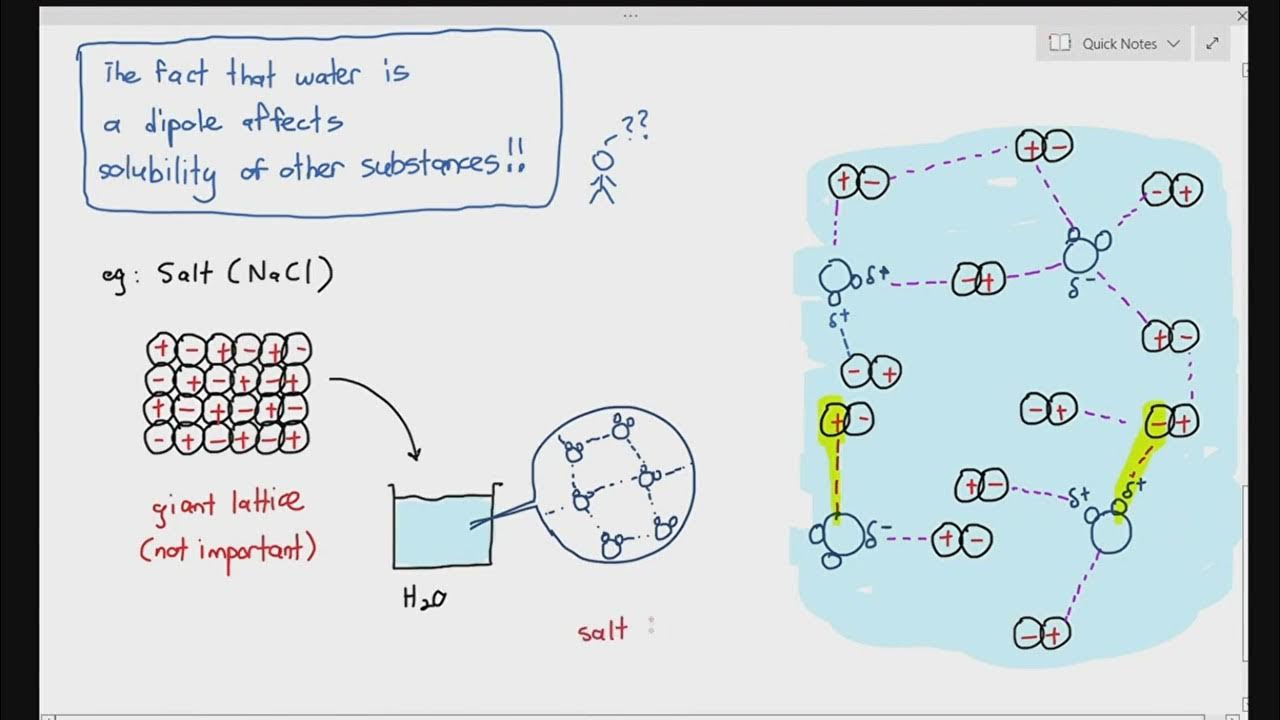Pop Up Science: Oil and Water
Summary
TLDRThe video explains the interaction between oil and water, emphasizing that oil is insoluble in water. When oil is added to water, the molecules of each substance do not mix due to their differing attractions; oil molecules prefer to cluster together, while water molecules do the same. This separation occurs because oil is less dense than water, causing it to float. The explanation highlights fundamental principles of molecular interaction and density, effectively illustrating why oil and water do not mix.
Takeaways
- 💧 Oil floats on top of water due to differences in molecular interaction.
- 🧪 Oil is insoluble in water, meaning it does not dissolve in it.
- 🔬 The interaction between substances depends on the molecules that make them up.
- 🌊 When oil is poured into water, the two types of molecules meet for the first time.
- 🔄 Stirring causes oil and water molecules to move around each other.
- ⏹️ Once stirring stops, oil and water immediately begin to separate.
- 🔗 Oil molecules are not attracted to water molecules; they prefer to stick together.
- 💧 Water molecules also tend to clump together, showing strong attraction among themselves.
- ⬆️ Oil is less dense than water, which causes it to rise and float on the surface.
- 🚫 This is why oil and water do not mix, leading to distinct layers.
Q & A
Why does oil float on top of water?
-Oil floats on water because it is less dense than water, causing it to rise above and separate from the water.
What does it mean that oil is insoluble in water?
-Insoluble means that oil does not dissolve in water; the two substances do not mix due to the nature of their molecular interactions.
How do oil and water molecules interact when mixed?
-When oil and water molecules are mixed, they move around each other, but they do not form bonds. Instead, they tend to clump together with their own kind when stirring stops.
What causes oil and water to separate after being stirred?
-After stirring, oil and water separate because oil molecules are more attracted to each other than to water molecules, leading them to clump together.
Why are water molecules more attracted to each other than to oil molecules?
-Water molecules are polar and form hydrogen bonds with each other, resulting in a stronger attraction between water molecules compared to the attraction they have with oil molecules.
What role does density play in the separation of oil and water?
-Density determines whether a substance will float or sink in another. Since oil is less dense than water, it floats on top when the two substances separate.
What happens to the molecules of oil and water when they are poured together?
-When oil is poured into water, the two types of molecules interact briefly but eventually separate, as the oil molecules are not attracted to the water molecules.
Can oil and water ever mix completely?
-No, oil and water cannot mix completely due to their differing molecular structures and the lack of attraction between oil and water molecules.
What is the significance of the molecular structure in the interaction between oil and water?
-The molecular structure determines how substances interact; in the case of oil and water, their distinct structures lead to incompatibility and separation.
How does stirring affect the behavior of oil and water molecules?
-Stirring temporarily mixes oil and water molecules, allowing them to interact, but once the stirring stops, the lack of attraction leads to separation.
Outlines

Cette section est réservée aux utilisateurs payants. Améliorez votre compte pour accéder à cette section.
Améliorer maintenantMindmap

Cette section est réservée aux utilisateurs payants. Améliorez votre compte pour accéder à cette section.
Améliorer maintenantKeywords

Cette section est réservée aux utilisateurs payants. Améliorez votre compte pour accéder à cette section.
Améliorer maintenantHighlights

Cette section est réservée aux utilisateurs payants. Améliorez votre compte pour accéder à cette section.
Améliorer maintenantTranscripts

Cette section est réservée aux utilisateurs payants. Améliorez votre compte pour accéder à cette section.
Améliorer maintenant5.0 / 5 (0 votes)






